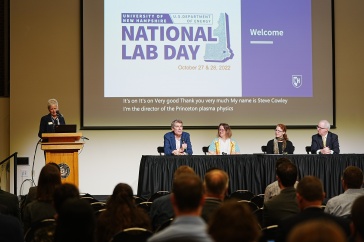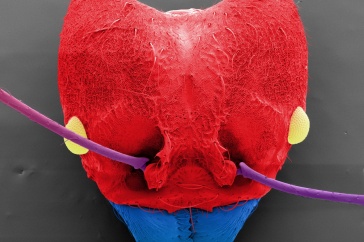
In the midst of a global pandemic, when many carefully weigh leaving their house for any reason, Anthony S. Davis and his family moved across the country from Oregon and bought a house in New Hampshire, sight unseen, as he prepared to become dean of the UNH College of Life Sciences and Agriculture on September 1. Now, the recognized global leader in seedling production and landscape restoration is putting down both literal and figurative roots in the Granite State and looking forward to applying the experience and skills he gained at Oregon State University to build upon and expand COLSA’s strengths as a leading academic research community.
One of Davis’s top priorities will be diversity, equity and inclusion. His plans include identifying specific goals and action items with a definitive timeline.
“The past few months have cast a glaring light on the systemic exclusion of Black people, Indigenous people and people of color from opportunities and advantages that white people have, and the continued — and now due to the pandemic, growing — systemic bias toward male success in academia and in science,” says Davis. “We need to be making changes now. We need to pick a spot where we want to be and drive toward it.”
Before joining COLSA, Davis was the executive associate dean at OSU’s College of Forestry, although he spent most of the last three years as acting and interim dean of the college. He provided vital leadership following the death of the college’s sitting dean in 2018, throughout a challenging major capital project, and more recently in the wake of the death of George Floyd and during the anger and unrest that has followed.
“I want to work on problems that I don’t yet have a solution to,” says Davis. “I don’t want to work in areas where it’s a relatively straightforward process. I want the big challenges. I don’t mind not capturing the low hanging fruit that sometimes seems so appealing if it means I have more time to spend on the grand challenges that we face.”
Along with working toward a more diverse, equitable and inclusive experience for all in the COLSA community, Davis is also looking forward to advancing solutions for what he sees as the two major crises the world is facing: a climate crisis and a sustainability crisis.
“If you look across the spectrum of work that’s conducted within COLSA, you see the college is addressing those crises through science and research and preparing its students to make decisions that will make us more sustainable and actually address climate issues, not just give lip service to climate issues,” says Davis. “We need to build on these existing strengths, and in the coming months as we’re focused on coming out of a pandemic and on a future that will include economic recovery, that we’re positioning COLSA to be the spot where everyone says, ‘We should see what COLSA is doing in this field.’ Figuring out how we do that is a big challenge. But when we get there, that’s going to be exciting.”
It was this big-picture thinking and readiness to take on more formidable challenges that led Davis to emerge as the top applicant for the COLSA deanship during a highly competitive search process.
“We are genuinely excited to have Dr. Anthony Davis assume the role of dean of the College of Life Sciences and Agriculture,” says Dave Mortensen, professor and chair of the department of agriculture, nutrition and food systems and the COLSA dean search committee co-chair. “Dr. Davis rose to the top of an exceptionally strong pool of highly qualified and interested applicants based on his impressive body of program-building accomplishments at Oregon State University. He hits the ground enjoying widespread and enthusiastic support from the COLSA community.”
Outside his role as dean, Davis leads ongoing projects in the Pacific Northwest, Caribbean, Africa, and Middle East that focus on improved nursery production practices for native plants and the restoration of degraded forests and rangelands, as well as teach rural community members to apply science-based methods to their restoration practices. He has a B.S. in forestry from the University of New Brunswick and earned his M.S. and doctorate from Purdue University.
“I expect a lot from myself,” Davis says. “And I expect people to be honest and give their best effort. I want people to succeed; I want people to find opportunities to grow their skillsets — lifelong learning and continuous improvement is really important to me. For me, strong leadership is always going to be about helping people succeed. It’s what I find most rewarding.”
And in case you’re wondering what kind of tree — if he were a tree — that this forest scientist would be, the answer is oak.
“There are so many types of oaks, and they grow in pretty amazing places,” says Davis. “They’re strong, sturdy and reliable. They live a long time and survive difficult events, and they provide immeasurable value to ecosystems and people.”
Davis succeeds Jon M. Wraith, who served as dean of COLSA for nine years and stepped down at the end of August.
-
Written By:
Sarah Schaier | College of Life Sciences and Agriculture



















































